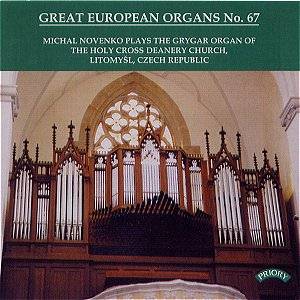The
word ‘Great’ can be over-used and it may be alarming for some
to ponder that Priory reckon that Volume 67 is justified in their
European Organs series. However one should have few qualms about
this instrument. It was built and completed in 2000 by the Grygar
Company and has four manuals and fifty-one stops. Its original
case was used but extended to now include an unusual Trompeteria
rank which makes up the extra manual. Many of the old ‘romantic’
stops have been retained meaning that the instrument still has
its traditional local character added to a new strong one.
It
is apt therefore that Michal Novenko has chosen has almost entirely
Czech programme including an improvisation by himself on a Martinů
theme, his last work,’Vigilia’ which Novenko has revised from
unfinished sketches. So his programme takes in the early 18th
Century repertoire, then moves to an anonymous Czech manuscript
to very recent pieces and it is interesting that the organ is
completely at home in all and any of it.
The
trumpet stops come into their own immediately in Petr Eben’s colourful
‘Preludio Festivo’ written for the Pope’s visit to Prague. On
the reverse of the booklet the picture shows the folly pipes protruding
from above the organist’s seat, it is an extravagant and theatrical
sight. They also stir the blood in Novenko’s brilliant Improvisation
which shows off his own virtuosity to full effect. One should
not be surprised to read that Novenka has studied composition
with Helmut Rilling in Stuttgart and has won prizes as an improviser
he also runs masterclasses on the subject.
Martinů
was born in Policka just thirteen miles from Litomysl, another
‘local boy’ is Bedrich Smetana born there in 1824, he knew the
church which is late 14th Century with substantial
work of the 17th and 18th Centuries after
a fire and may well have heard his ‘Six short preludes’ in this
Deanery church. That must be the only reason for presenting this
very early work as it otherwise rather featureless.
Both
in the Smetana and in the Martinů I find myself feeling that
Novenko might have found some slightly more colourful and varied
stops. This criticism, however, does not apply to his fine performance
of Bach’s D minor Fugue. Originally in C minor but adapted by
Johann Seger for organ who mysteriously transposed it in the process.
Baroque music is very successful on this organ due I think to
its fine specification on the ‘Choir’ including an eight foot
Wooden Cromone and the flute stops on the ‘Great’. Particularly
pleasing are the three rather non-descript, anonymous pieces from
the Chocen Manuscript c.1770 I should think.
The
Romantic repertoire is also represented by a name new to me Josef
Klicka whose ‘Legenda’ is the longest work in the programme being
in three contrasted sections. It is a happy mixture of Tchaikovsky
and Suk/Novak with a touch of Rheinberger.
The
contemporary pieces in addition to the ones already mentioned
are by the Ukrainian composer Georgi Mushel, a beautiful if slightly
prolix Aria and a Toccata not unlike Matthias, however the booklet
notes, written by Michal Novenko himself are somewhat ‘over the
top’ to describe it as ‘A sabre dance for organ’. The recording
is good if slightly bass-light.
Gary
Higginson
